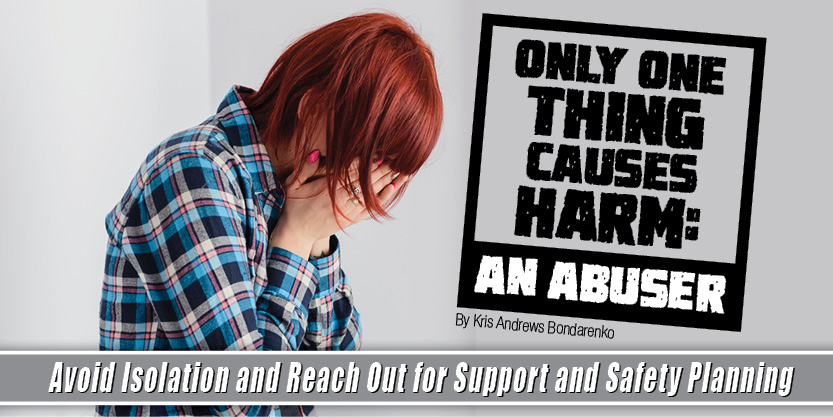Only One Thing Causes Harm: An Abuser
By Kris Andrews Bondarenko
Avoid Isolation and Reach Out for Support and Safety Planning
A popular myth about domestic violence is that reported incidents spike during the Super Bowl.
Although this cultural phenomenon helped raise awareness around the issue of intimate partner violence, it is not entirely accurate.
Essentially, holidays and special events do not cause domestic violence – it is caused by an abuser.
The National Coalition Against Domestic Violence reports that “1 in 3 women and 1 in 4 men have been victims of [some form of] physical violence by an intimate partner within their lifetime.”
It’s important to understand that domestic violence (also called intimate partner violence, domestic abuse or relationship abuse) is a pattern of behaviors used by one partner to maintain power and control over another partner in an intimate relationship.
Is domestic violence linked to holidays? Only insofar as increased alcohol consumption, which is more socially acceptable during holidays, is a risk factor for domestic violence.
However, as psychologist David Adams points out: “Overall research about domestic violence during holidays shows that the holidays do not cause domestic violence, but also that domestic violence does not take a holiday either.
“Contrary to popular misconception, domestic violence is not caused by alcohol, excessive revelry, stress, expectations, financial woes or meddling in-laws.
“Domestic violence is not caused by situations, but by abusers who are intent on imposing their will on their partner, regardless of what day of the week or time of year it is.”
This willing intent includes physical violence and intimidation, but can also include verbal, psychological, financial and spiritual abuse.
As for the timing of increased risk, the danger spikes whenever the victim tries to separate him or herself from the abuser and leave the relationship.
That is why it is important for survivors to reach out for support and safety planning to local victim’s advocates or agencies like Greenhouse17, formerly Bluegrass Domestic Violence Program.
“Certain types of abuse can be hard to identify when you are living it day-in and day-out,” said Darlene Thomas, Executive Director of Greenhouse17, who offers the following advice to victims.
“Trust yourself, your gut and reach out,” she said. “Read about types of abusive personalities and how these people are as partners and how they parent children.
“You are strong enough to deal with the answers. It is the not knowing that makes you doubt your experiences and try to fix what is not yours to fix.”
For anyone who might witness or over hear any incidents of domestic violence, call 911.
If someone you know is in an abusive relationship, do your best to offer nonjudgmental support.
Isolation is often a key strategy of abuse. Maintaining your support could make a tremendous difference in letting the survivor know he or she is not alone.
Resources:
National Domestic Violence Hotline:
(800) 799-7233 (SAFE)
Greenhouse17: (800) 544-2022.
 Kris Andrews Bondarenko is an Empowerment Coach with Passionate Life Solutions specializing in helping others rebuild their lives after loss or leaving damaging relationships.
Kris Andrews Bondarenko is an Empowerment Coach with Passionate Life Solutions specializing in helping others rebuild their lives after loss or leaving damaging relationships.
She holds a master’s degree in Mental Health Counseling (Asbury Theological Seminary, 2014) and her professional background includes domestic violence advocacy, bereavement counseling, and facilitation of support groups and workshops.
She was a Communications Specialist with Bluegrass Domestic Violence Program (now known as Greenhouse17) for three years. She volunteered with the Family Justice Center in Tampa and is also a survivor of domestic violence.
Kris also worked at Lexington Family Magazine. Contact her at www.passionatelifesolutions.com.

